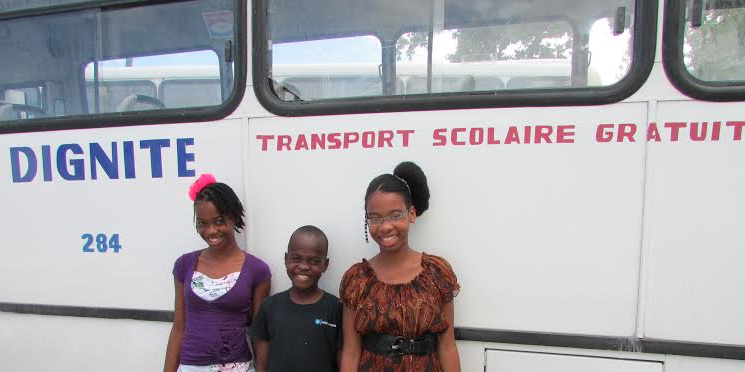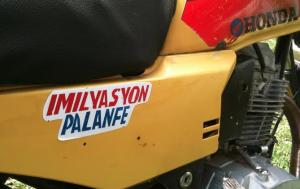Culture Profile: Haiti
Sean Christensen serves with World Team as a Bible college professor, training current and future church leaders in Haiti. Sean and his students recently surveyed nearly 400 Haitians using TheCultureTest.com.
What does honor & shame look like in Haiti? Although Haitian society is strongly hierarchical, on the street Haitian men laud one another with honorific titles, such as “Patron,” “Papa,” “My chief,” and even “My dear one.” Also, when someone makes a good decision or speaks tactfully, others around him will verbally congratulate him for it. When a polite Haitian approaches a house to see if anyone is home, he or she will call out “Honor?” The person inside will then reply, “Respect!” 
The public school buses in Haiti are marked with the words “DIGNITY,” and education is definitely seen as the path to elevating your status. Although shame and humiliation are commonly used in child-rearing and in education, outside of those spheres they are not appreciated and rarely tolerated.
However, one humorous vignette you sometimes see on vehicles is “Imiliyasyon pa lanfè” meaning “Humiliation isn’t Hell.” It’s a reminder that there are indeed worse things than being humiliated.
What words communicate honor and shame? “Respe” means respect and this is the most valued virtue in Haiti. “Wont” means shame, and nobody wants that! “Saj” literally means wise, but to call a person “saj” means he or she knows how to talk with others in a way that makes them feel valued.
Based on TheCultutreTest.com, what is the cultural orientation of Haitians? 42% guilt/ 37% shame/ 21% fear I had my Bible college students take The Culture Test in Creole. To my surprise, “guilt” was the top sensitivity for all of them. I thought this is because they’ve studied theology! However, I assigned my students conduct The Culture Test surveys in Creole, and again “guilt” was the primary sensitivity, regardless of demographic. Note: the 367 people taking the survey were all from Cayes (the most evangelized region in the country) and were disproportionately Protestant. Here are the results:
- Protestants-43/37/20
- Catholics-42/35/23
- Voodooists-36/35/29. Even though voodooists were only 6% of the total participants (23 of 367), they comprised 67% of those who scored highest in “fear” (10 of 15).
- 0-6th grade education-39/34/27
- 7th+ grade education-42/28/20
- Age and gender has minimal impact the survey results.
Although Haitians have a proverb “The Constitution is paper, the bayonet is iron” (a sentiment strongly attested in their history), Haitians do have a very strong sense of “principle” and “protocol.” These aren’t enshrined in legal documents, but if something is a principle, you’d have to be a vagabond to disregard it. This trait in the Haitian conscience clearly came out in The Culture Test.
An honor-shame story? A missionary colleague unintentionally conveyed to a young Haitian believer that he didn’t trust him. When I saw this young man he looked sick, like he had typhoid. I asked him what’s wrong and he explained the situation to me. He told me, “I can go three days without food, but without respect I cannot live.” I offered to pray for him and in my prayer I thanked God that Jesus bore our shame on the cross, lifted us from being nothing and made us His beloved children through Christ. The same young man opened his eyes and widely grinned. His face was radiant with God’s love that had elevated him to a place of honor and that overcame the disrespect he felt from an esteemed foreigner.
How have you addressed honor and shame in your ministry? So far, I haven’t seen HS dynamics in the gospel message to be very useful in evangelism in Haiti. Effective evangelism focuses on the guilt and fear aspects of the message. The HS dynamics are seen in how one talks to an unconverted person—patiently, respectfully and by expressing the personal advantages of following Jesus, which shows that the evangelist cares about the needs of the person, as opposed to a health-wealth gospel. However, HS awareness pays big dividends in discipleship! In the Haitian social hierarchy everyone is consciously above or below those with whom they interact. To emphasize our adoption through Christ empowers Haitian believers to obey Paul’s admonition in Galatians 5:26, “Let us not become conceited, provoking [superiority complex] and envying [inferiority complex] each other.” Likewise, that Jesus would wash his disciples’ feet, an act of abhorrent humiliation, was because he “knew that the Father had put all things under his power, and that he had come from God and was returning to God” (John 13:3). When a Christian leader knows his esteemed, beloved and elevated position in Christ, this liberates him to humbly serve like Jesus without fear of humiliation.
What one advice would you give to newcomers to Haiti? Haitians are extremely gracious and patient people, but communicating disrespect toward a person will make them very angry or totally depressed. Most Haitians assume that foreigners think they are better than Haitians. So when a missionary expresses value and respect to a Haitian, they take note! Photo credit: Sean Christensen
Related Posts:
- The 5 Types of Honor-Shame Cultures
- Culture Profile:Botswana
- Culture Profile:Cambodia
- Culture Profile:Ireland
- Culture Profile:Thailand
- Culture Profile: Kenya

Excellent! These culture profiles are very insightful and helpful. Thanks
Thanks for such a clear explanation, Pastor Sean! I wish I had been more aware of this dynamic during our time in Haiti. It does seem basic that one can’t go wrong showing respect & honor to people in any culture. Thank God that Christ’s work has removed our shame & guilt, & His perfect love casts out fear!
Very insightful Sean. When I re-located to the States after 35 years in the West Indies, what feels like a lack of respect and sense of honor in personal relationships has been the most difficult part of adjusting to American culture. Makes me appreciate the sensibilities you describe for the social virtues that they are.
I can understand that, Duane. Even before I moved to Haiti I noticed the divergence between US culture and the biblical admonition to “show proper respect to everyone. Love the brotherhood of believers, fear God, honor the king” (1Peter 2:17). Now living in an honor-giving society, as you did, you can “feel” the blessings of it and you notice the absence of it when you’re away. You’ll have to come back to Haiti in April to get your honor fix 🙂
I’m a Haitian Missiologist and Haitians are Africans living in the diaspora. The Haitian culture is a mostly a Fear-Honor culture. To understand Haitian culture in it’s authentic sense, one must go to the rural areas of Haiti least affected by Western culture and colonization. Colonization really confuses and alienates people.
Honor-Shame culture is seen in the countryside with “one respe”, “konbit”, “men anpil chay pa lou”, ede m priye m’a ede ou priye”, “san wont”, “wap fe fanmi an wont”. Haitian proverbs will give one an authentic taste of Haitian culture. Haitians have historically been a collective people. However, through French-based, Western education in Haiti has taught many Haitians to think individualism and Western culture is superior and better than the collective. Many Haitian have been taught to dislike and disassociate from Africa or anything African.
Power-Fear culture is a reality in Haiti and I fear that a written test (even in the Haitian language) may make Haitians answer based on what “the missionary” would want to hear. Haitians were evangelized by conservative and fundamentalist whites who pleached a highly Westernized and one dimensional gospel which was tailored to an Innocent-Guilt society. Thus, many Haitians today may think this way, not because it’s culturally authentic, but because this is what they have been taught by conservative white (and then Haitians preached it to each other). Culture is learned behaviors and thoughts and this is what has been taught through schools, churches and the Westernization of Haitian society. This may be why even the Vodouyizan answered more favorably for Guilt culture. Within the Vodou community Fear-Power is huge and Honor-Shame is important because when you disrespect or dishonor (malonet) someone they will seek revenge. But on the test may they choose “People in danger get protection from: police”, even though in reality they would go to a Boko’s house.
The reality of Fear culture in Haiti is seen through all the prayer and fasting meetings during the week. Emphasis on the “mond envizib”, “djab rasyal”, dreams play a big role for Christians and Vodouyizan. One newborn is in the house, the family may guard against a “lougawou” who may seek to go on the roof of the house and cause harm to the baby. There are many prayer services that finish at midnight. And when Haitian talk about future events, they normally say “Si Bondye vle” or if God wants (God willing); this shows that they place major emphasis on God and His control. This is not fatalism, but trust in God’s sovereignty.
If results in Haiti emphasizes Guilt, this is due to Western colonization and Western education and answering based on what the Western missionary wants to hear. Haitians who live in Haiti on a day to day are seeking protection from evil forces and honor and respect in society. There’s a Haitian proverb that says “degaje pa peche” (to get by is not a sin). This shows that Guilt culture is not as high as the results show. (“san konsyans” without conscience/guilt can be interpreted as being “san wont” without shame). Living among Haitians according to their standards of living will change the missionaries perception of Haitian culture. Haitians functions within a variation of Fear-Shame culture.